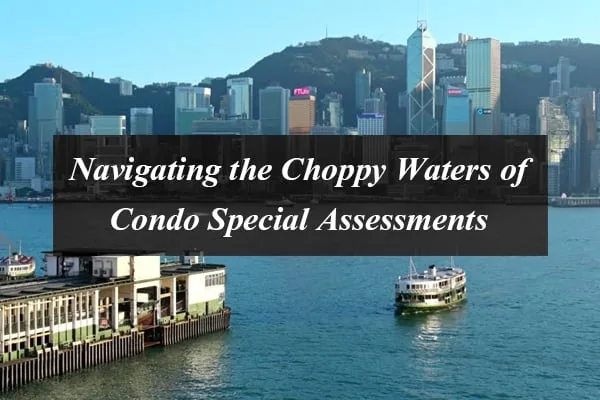Navigating the Choppy Waters of Condo Special Assessments
There are plenty of great perks that come along with being a condo owner. You get to be part of a close-knit community, the overall costs are generally more affordable than those associated with owning a stand-alone home, and so long as you’re paying your condo fees,
you don’t even have to do all that much yard work (so long, a lawnmower that only works every other time you pull it out of the shed)!
Now, that being said, nothing’s ever all sunshine and roses – condo ownership included. When you own any sort of real estate, there can be sudden, unexpected costs that you’ll be expected to manage and deal with as they come up. For condo owners, these often come in the form of condo special assessments.
These situations aren’t fun for anyone – condo management companies, boards, and residents alike – but with the right touch and some clear communication, your building will get through any special assessment that comes its way.
What Exactly is a Special Assessment?
Special assessments are basically your condo board’s way of handling any unexpected costs that come up and can’t be put off, and for which there are no existing reserve funds within the budget: they are a collection of funds outside of an owner’s normal condo contributions for a defined set of items or a clearly outlined body of work. Common types of condo special assessments can include collections for major projects that exceed the plans laid out within a building’s reserve fund study, the unexpected failure of a critical piece of building hardware (such as a boiler or other similar piece of equipment going on the fritz), or any other situation in which the immediate well-being of the building will be put in jeopardy without the proper attention and maintenance.
Now, while all of this sounds like a perfectly reasonable approach to handling unforeseen issues on paper, it doesn’t take a crystal ball to predict that dropping these sorts of unannounced costs on a community of individuals will go over about as well as a lead balloon.
Don’t worry, though – they call us expert condo managers for nothing! We’ve got some helpful tips to help you get through even the most surprising of condo special assessments.
Getting Through Special Assessments as a Condo Community
If you haven’t already guessed, special assessments condo can potentially cause things to get pretty heated within a condo community. We can’t promise it won’t be a rocky road, but if you follow these basic principles throughout the process, you should be able to make it through mostly unscathed:
- Definitions. When your board puts forth a condo special assessment, there’s nothing more important than laying out and defining the scope of every detail, item, cost, line of work, and expense that these funds will be put towards. Your building’s residents will already be feeling a bit burned that these costs weren’t anticipated by the reserve fund study (your building does have one of those in place, right?), so the last thing you’ll want is to be spotty or vague on even the most mundane-seeming detail. Lay everything out, and make it crystal-clear what these funds will be used for.
- Communication. This will be key in not only appropriately conveying the need for a condo special assessment to residents, but also in giving owners a platform to express their thoughts, insights, and feelings regarding the assessment itself. Holding a townhall is a brilliant way to illicit this feedback – much of the “communication” may just be (entirely understandable and necessary) venting, but some of the residents’ reactions might be constructive towards helping the building avoid running into the same sort of issue again in the future.
- Notice. Nobody likes having to come up with a bunch of money on the spot, so be sure to give residents as much notice as is realistically possible. Further, provincial legislation dictates that contributions must be calculated in proportion to the unit factors of the owners’ respective units, or by another method that may be specified within the community’s bylaws – so be sure to collect in accordance with these stipulations and mandates. For larger projects, we suggest providing at least a year’s notice (yes, some condo special assessments can become multi-year projects) to give residents the time to obtain the funds without being able to pay their condo fees, mortgage, and other expenses.
We won’t sugar-coat it for you – special assessments can be a real pain in the butt for everyone involved. If you take our advice into account, though, your board should be able to navigate these choppy waters and steer your condo community towards calmer tides once again.
Is your condo community facing a condo special assessment? Does your board need a bit of a hand making it through to the other side? Give us a shout at Catalyst Condo Management Ltd, and we’ll work with you to help make the experience as brief and painless as possible.

